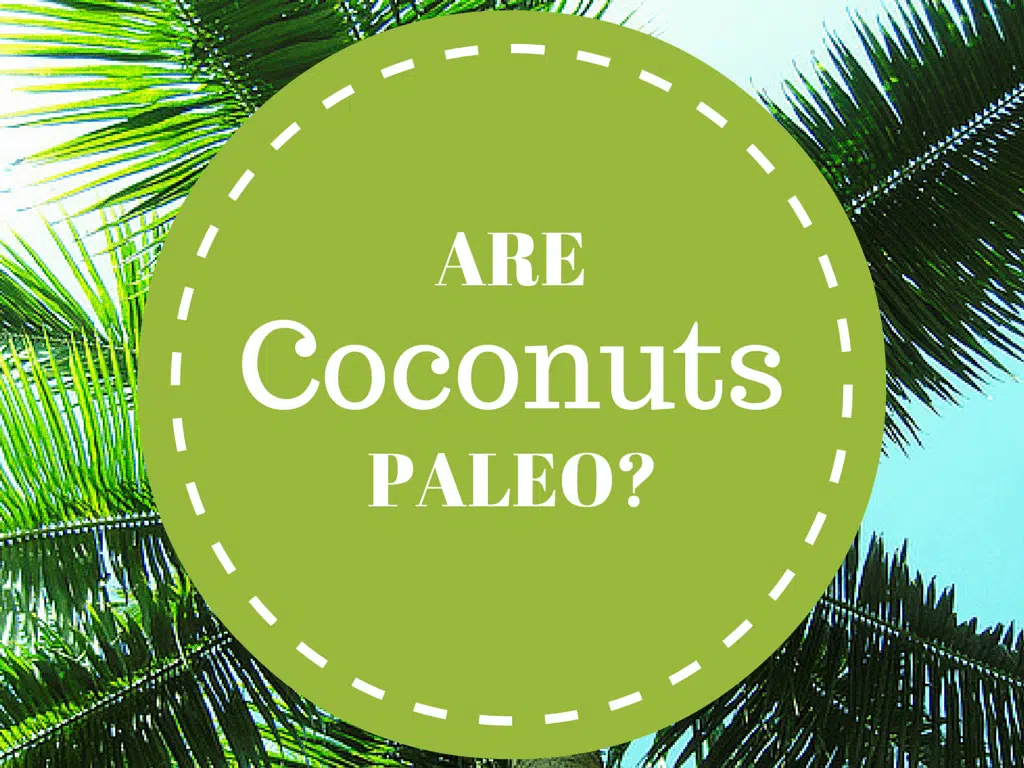The Quick Answer
Yes, coconuts are paleo. This includes all parts of the coconuts, and all products made from the different parts: coconut milk, coconut water, coconut cream, coconut flour, dried (unsweetened) coconut chips/flakes, coconut oil and coconut butter.
Why Are Coconuts Paleo?
Coconuts are one of the most popular foods on the paleo diet – and for good reason. They are made of beneficial, healthy saturated fatty-acids and are high in potassium, B vitamins, fiber and other important nutrients too. Plus, they taste really good, are cheap and sustainable, and are easy to use in all kinds of ways!
What will you find when you crack open a coconut? First, you’ll notice the coconut water that comes dripping out. This is different from coconut “milk”, which is the product made when you blend and strain coconut “meat”. Coconut water tastes delicious all on its own, without any added sugar, and has these benefits:
- Great source of potassium which acts as an electrolyte and balances fluids within the body
- Helps prevent dehydration and also reduces bloating and indigestion
- Contains antiviral and antifungal compounds
- Perfect for refueling after a workout and providing the muscles with glucose with essential minerals
Sure, you can easily find coconut water all over grocery store shelves today, but there’s nothing as beneficial as drinking it straight from the source. Cracking open a young coconut is the ideal way to consume coconut water, so look for whole coconuts at health food stores, Asian and farmer’s markets, or even online.
Aside from drinking coconut water, you can also benefit from eating coconut meat. There are lots of uses for coconut meat: drying it into coconut flour, making it into coconut flakes, blending it into smoothies, using it to make coconut milk or cream, and the list goes on.
What are the benefits of the meat itself? This is where all the fiber lays, which is crucial for maintaining healthy digestion, improving heart health and keeping you full too. Coconut meat is also the source of coconuts’ healthy saturated fats, which benefit skin, brain, eye and hormonal health. Additionally, coconut meat is high in iron, vitamin C and B vitamins – so they can help give you a good boost in energy, increase immunity, aid in nutrient absorption and improve your mood.
Coconut oil is made by pressing the naturally occuring oil out of coconut meat at very high pressures, usually using an “expeller press” (ideally under “cold pressed” conditions). Coconut oil is unique because it’s made mostly of medium-chain fatty-acids. This is important because the body responds to fats differently, especially saturated fats. Medium-chain fatty acids are highly digestible and easily converted to energy, which isn’t usually the case with the kind of saturated fats found in manmade, processed products: long-chain fatty-acids
According to numerous studies, coconut oil has these benefits:
- Helps with digestion, especially for people who suffer from digestive issues that makes it hard to metabolize fats
- Helps balance blood sugar levels (important for people with metabolic syndrome and diabetes)
- Can help defend against cancer
- Has antimicrobial properties that prevent infections
- Is easily used by the body to create energy and absorb nutrients, which helps prevent fatigue and deficiencies
Something else important about coconuts? Their highly saturated fats make them very shelf-stable and one of the best fats to cook with. Coconut oil has a very high smoking point, especially compared to polyunsaturated vegetable oils like canola or safflower oil. Coconut oil can withstand high-heat cooking without becoming rancid or toxic, so it’s perfect for roasting or grilling for example.
Coconut products are great for eating, since they taste and smell great plus they withstand heat well, but you can also use them on your skin. Coconut oil is a natural way to get rid of dry skin, prevent or treat breakouts, and even to heal cuts and scrapes faster without the need for chemical ointments and store-bought products.
Is There Any Debate Over Coconuts Being Paleo?
No, definitely not – coconuts are one of the foods that usually make a regular appearance in the paleo diet in lots of different ways. That being said, you want to get the highest quality coconut products you can, meaning the most natural kinds with the least amount of added ingredients.
For example, the best kind of coconut milk to drink is the kind made with minimal, straight-forward paleo-approved ingredients: full-fat coconut, water, and maybe a little bit of a natural sweetener (like raw honey or organic stevia). So if you’re buying premade coconut milk or bottled coconut water, always keep a close eye on the ingredient label. And remember you can easily make your own coconut milk, coconut flour and coconut flakes by looking for whole, young coconuts. When it comes to coconut oil, look for organic, expeller-pressed (or cold-pressed) unrefined coconut oils.
So Are Coconuts Paleo?
Yes, coconuts are paleo.
How to Know What Is and Isn’t Paleo
Check out Paleo.io, the mobile app that answers the question, “is __ paleo?” Paleo.io comes with the most comprehensive paleo diet food list out there, so no matter which food you’re confused about, you’ll always be able to find out whether or not it’s paleo.
photo credit: Diffferent Light
